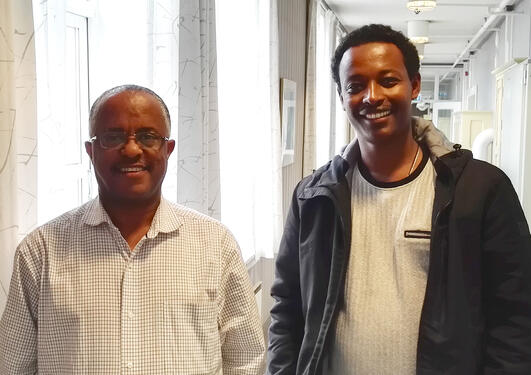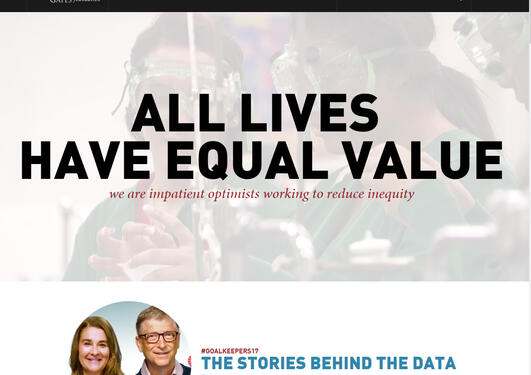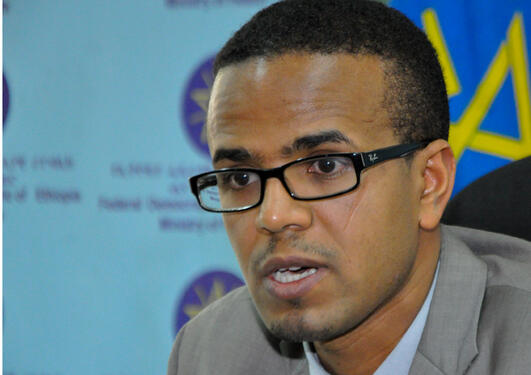Getachew Teshome Eregata: Capacity-strengthening for better national health
Getachew Teshome is combining a leadership position at the Ethiopian Federal Ministry of Health and taking a PhD in evidence-based, cost-effective health priority setting at UiB.

Hovedinnhold
Teshome is part of a capacity-building project that is funded by the Bill & Melinda Gates Foundation (BMGF). (Learn more about the Disease Control Priorities-Ethiopia (DCP-E) from the project web page.)
Striving to attain SDG 3.8 Universal Health Coverage
Ethiopia’s Federal Ministry of Health (FMOH) has an ambitious and all-encompassing vision. Despite numerous challenges in implementation, Ethiopia aims to attain Sustainable Development Goal 3 (SDG 3), pertaining to health. This includes sub-target 3.8 relating to Universal Health Coverage (UHC) for all segments of the population. Teshome says that
“In order to make progress towards UHC, countries should prioritize and clearly define the type and mix of essential health services that matches the needs of the population within the available resources.”
Revising Ethiopia’s Essential Health Service Package (EHSP)
Ethiopia undertook the ambitious step of establishing an essential health service package for its people in 2005. FMOH has been unable to carry out the original intention of revising this package every 5 years. The Gates funding will enable FMOH to train experts in the latest knowledge and methods in evidence-based, cost-effective health priority setting approaches to revise their EHSP.
The goal of Teshome’s PhD thesis work is to evaluate the current EHSP in Ethiopia, and to provide evidence-based input to the design of a revised primary health care package for the country.
Three objectives – three papers
- determine current service coverage of essential health services in Ethiopia.
Paper 1: Measuring progress towards universal health coverage: National and sub-national analysis in Ethiopia
Paper 1 has been accepted for publication (British Medical Journal, Global Health). The analysis of population health data showed that Ethiopia had an average of 34% UHC in 2015, although regionally this varied from 52-10%. The coverage also varied in health area, with the greatest UHC on average for the country being for infectious diseases (53%). Teshome concludes the paper with the recommendation that policymakers should take corrective measures” to narrow the gap across regions”. He provides some concrete suggestions for how this could be undertaken.
- generate evidence for candidate interventions based on cost effectiveness analyses for the essential health services.
Paper 2: Generalized cost-effectiveness analysis of 159 health interventions for Ethiopian essential health service package
Health interventions vary widely in cost-effectiveness. This paper provided input on combining this information with data about Healthy Life Years gained, equity and other societal goals. While this paper is only in draft phase, Teshome has already included some recommendations including:
- the Federal Ministry of Health in general and each department in particular should scale up the implementation of the very cost-effective interventions
- the Ministry of Health should design mid-term and long-term plans that can inform ways of providing for costly interventions
- document the process for defining an EHSP.
Paper 3: Revision process, methods and key features of Ethiopian essential health services package
In this paper, still in draft form, Teshome explains the participatory approach that is being used to develop a roadmap for the package revision process. They have stablished a core team composed of epidemiologists, health economics and health system specialists. This core team is backed by a technical working group of experts. Together they have held several consultative workshops, 7 prioritising criteria were defined for developing a comprehensive list of health interventions in Ethiopia. At this point in the study, a list of 1023 essential interventions have been identified and further designated as being high, medium or low priority.
Making a difference
At his mid-way evaluation 22 October, 2019, Teshome was well informed about global health targets, and about the facts of the situation “on the ground” in Ethiopia. His evaluators, Bernt Lindtjørn and Asela Perera / Bente E. Moen, gave him constructive feedback about his PhD work, thus far. This research seems well on its way to making a positive impact on the revision of Ethiopia’s EHSP, and perhaps to making a blueprint for future revisions!


